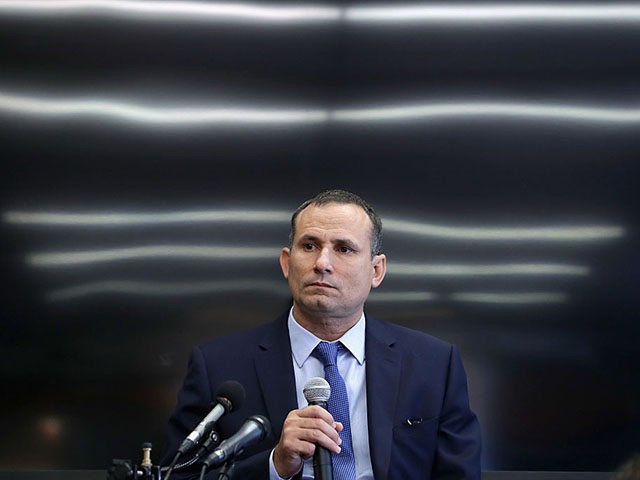Over 60 members of the Patriotic Union of Cuba (UNPACU), believed to be the island’s largest pro-democracy dissident group, marked ten days of a group hunger strike against the regime on Monday.
UNPACU leader José Daniel Ferrer, who is participating in the hunger strike, said in public statements that police had surrounded his group’s headquarters in Santiago de Cuba, the largest city on the island’s east side. UNPACU had begun attempting to distribute food and medicine out of its headquarters in light of growing shortages that greatly escalated in the past three years, though have become even more acute as the Chinese coronavirus pandemic limits tourism revenue for the regime. Police agents surrounded the headquarters to prevent the distribution of humanitarian aid, prompting the hunger strike.
“There are over 60 activists on hunger strike and four who had to abandon [the strike] given health problems,” Ferrer said. “The tyranny fears us. Gandhi achieved more with a hunger strike than the United States with thousands of soldiers in Vietnam.”
“Down with communism. Down with hunger and misery,” he concluded.
The strike began on March 20; including that day, those participating have spent ten days without food.
Ferrer also shared a video on Sunday of the UNPACU headquarters and some of those on hunger strike inside. Given the many days without food, many of those in the video are lying down and appear immobile and extremely thin.
In an update last week, Ferrer stated 63 people were on hunger strike, 55 of them within Cuba. Not all of those in Cuba are concentrating in the Santiago headquarters. One woman, Niuvys Vicet Romero, told the website ADN Cuba that she chose to participate in the protest as a UNPACU member despite the government repeatedly threatening to take her two children away if she continued to participate in anti-communist activism.
“My only fear is that they seize my house, they take my children and put them in a disciplinary school, as they’ve threatened me with so many times,” Vicet said. “To this add political repression against vulnerable people, old people, women, and minors, who just wanted to receive food or medicine at the UNPACU headquarters. My own children were violently assaulted by political police and threatened with being interned in a juvenile detention center because they received food.”
The Organization of American States (OAS) weighed in on the hunger strikes this weekend. Secretary-General Luis Almagro, whose sternly worded statements have irked Latin America’s socialist dictatorships, urged “the end of repression, especially the use of police violence to suppress the humanitarian work that the Patriotic Union of Cuba conducts.”
“We once again ask the international community to take concrete actions to end impunity for the Castro regime,” Almagro stated. “We denounce that the dictatorship in Havana applies state terrorism against its citizens. It does so through violence on the part of its repressive system, through harassment, and through arbitrary detentions.”
Hunger strikes have a long history as a tool in the arsenal of pro-democracy dissidents in Cuba, and the Castro regime has a long history of allowing hunger strikers to die without meeting their often modest requests for enhanced freedoms and limitations on communism. UNPACU itself has held several mass hunger strike initiatives in recent memory to pressure the Castro regime into humanitarian reforms with little success. In 2019, for example, 89 UNPACU members held a hunger strike to protest proposed constitutional reforms that would expand the Communist Party’s powers on paper to better match the reality of the abuses Havana regularly perpetrates against its people. In a letter to President Donald Trump, the hunger strikers described similar harassment and abuse as what they are experiencing today.
“Since February 11th, the regime’s repressive forces have permanently surrounded the organization’s headquarters and have arrested those that attempt to enter or exit. For example, a 16-year-old has been beaten and detained as he left the headquarters in search of food for his 23-month-old niece since food items were stolen during the raid,” the letter read in part. “Although repression has been occurring with unusual fury in the last few days, actually since our campaign for the ‘NO’ to the Constitution began, the regime has increased its attacks against us.”
The constitutional reforms “passed” in an unfree referendum and, by the end of the year, José Daniel Ferrer had disappeared. Cuban state security arrested him on October 1, 2019, after a raid on the UNPACU headquarters and disappeared him for weeks, prompting protests organized by UNPACU, his family, and international calls from human rights groups for proof that he was alive and safe. While ultimately revealing that Ferrer was alive and imprisoned after international repudiation, the Cuban regime kept him in prison for six months without due process. Ferrer was freed in March 2020 into “house arrest” and vaguely accused of battery against an unknown assailant with no evidence of any such incident divulged.
Police briefly arrested Ferrer and his wife and child in November 2019 again after Ferrer failed to cease his activism.

COMMENTS
Please let us know if you're having issues with commenting.